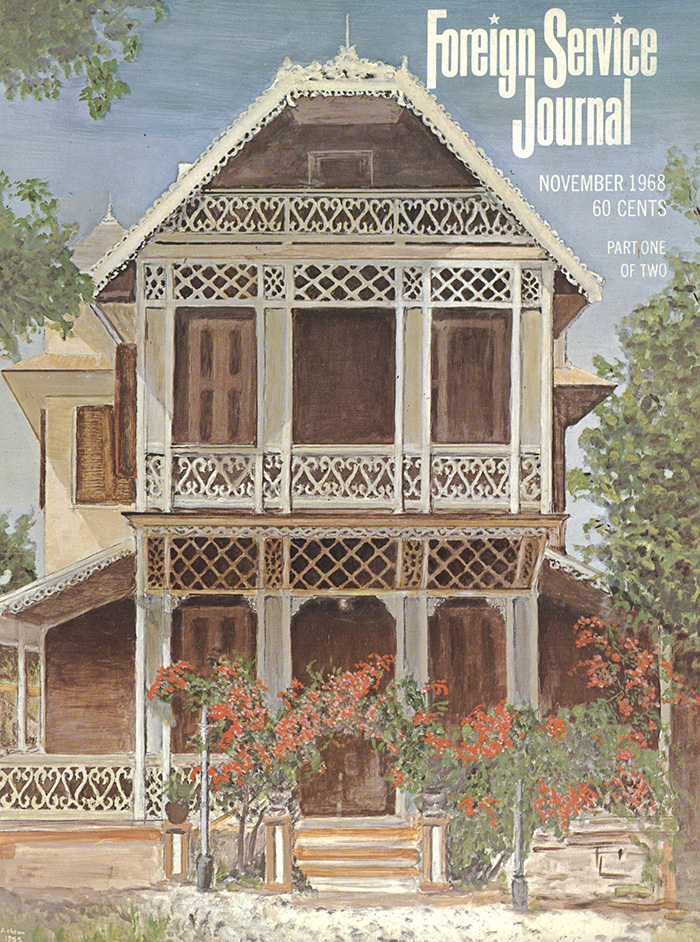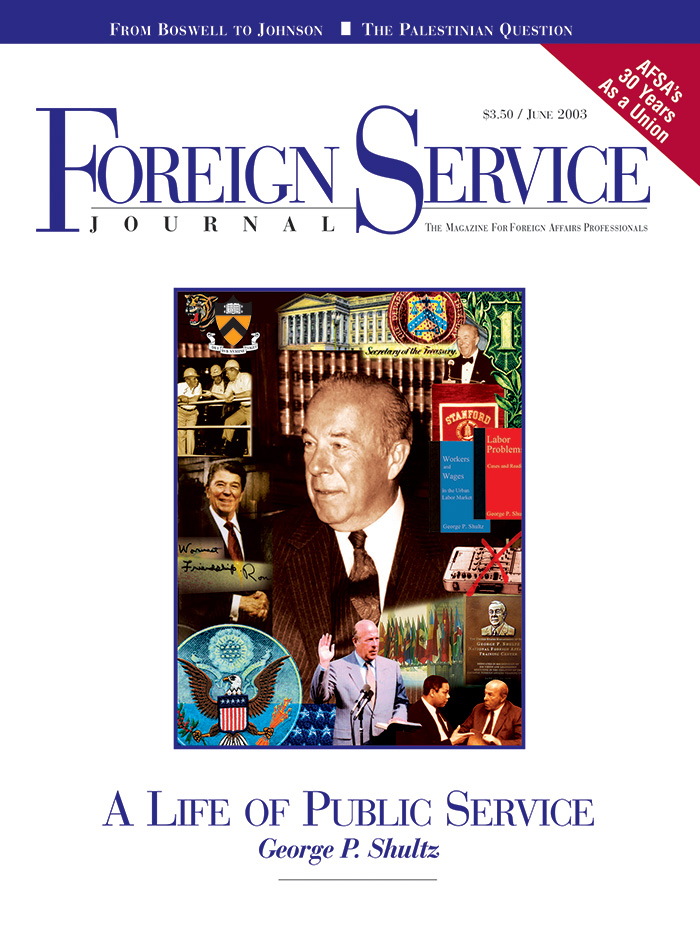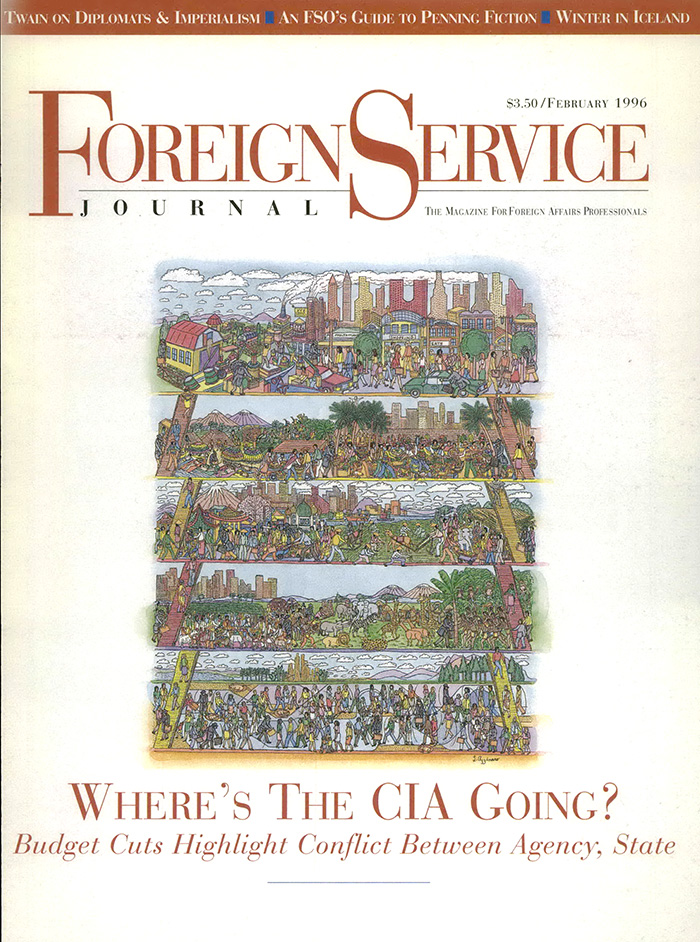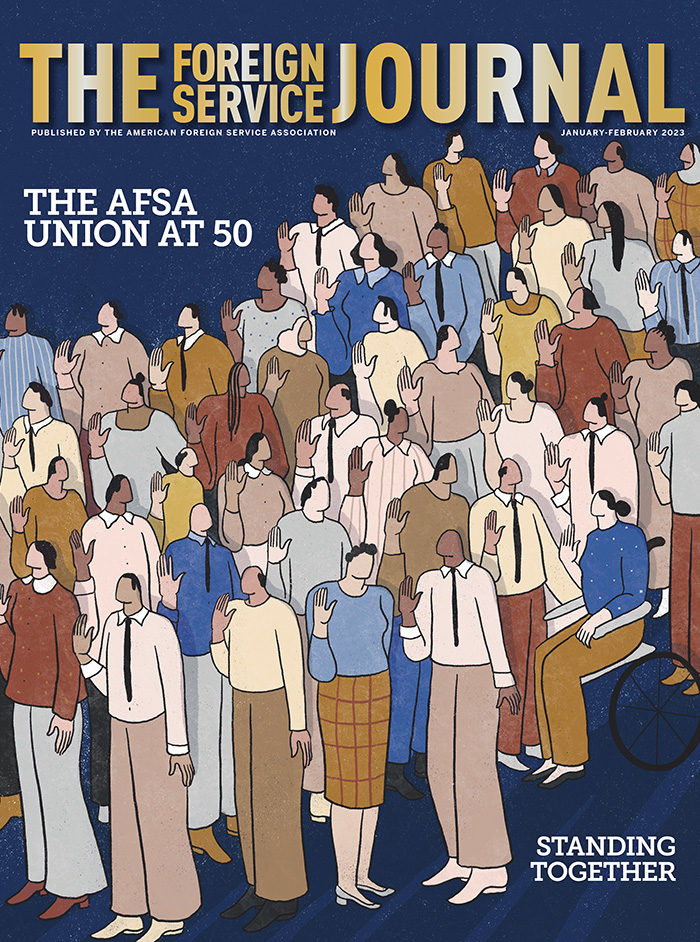From the FSJ Archive: The Journal on 100 Years of AFSA
An Appreciation

The personnel of the Foreign Service is scattered to the ends of the earth, and its work is as widely removed from the range of popular vision. What gratification it brings, therefore, that a busy Congress, beset with the perplexities of great national issues in a campaign year, should have paused in its deliberations to reshape the machinery of our foreign affairs! No politics was played with the issue, and no spirit of partisanship was there to warp the finely drawn parts of its delicate mechanism.
The [Rogers] Act of May 24, 1924, stands as a tribute to the patriotic vision of those who have supported the cause of an adequate foreign service and contributed so effectively to its realization. On behalf of the American Consular Association, the BULLETIN extends its greetings and its sentiments of profound appreciation to all who have shared in this constructive achievement.
—American Consular Association/Bulletin (precursor to AFSA/the Journal) editors, July 1924.
The Foreign Service Honor Roll

In January 1929, members of the young organization read in the American Foreign Service Journal … that the AFSA Executive Committee had received a proposal to create an honor roll to be displayed at the Department of State. This would memorialize all American consular and diplomatic officers who had died under tragic or heroic circumstances since the founding of the republic. The proponent, whose name was not given, listed 17 names for inscription. The Executive Committee did not explicitly endorse the proposal but did invite members to suggest additions or corrections. Letters came rolling in. …
The Memorial Tablet’s unveiling took place on March 3, 1933, in the north entrance of the State, War and Navy Building next to the White House. Secretary Stimson … presided as 10 senators and congressmen looked on.
The tablet, said the Secretary, “should serve as a means of bringing home to the people of this country the fact that we have a Service in our Government devoted to peaceful intercourse between the nations and the assistance of our peaceful commerce which, nevertheless, may occasionally exact from its servants a sacrifice the same as that which we expect from our soldiers and our sailors.”
—AFSA Retiree Vice President John Naland, May 2020 FSJ.
AFSA’s Statement on Pay Comparability

The American Foreign Service Association represents some 8,000 foreign affairs professionals. We wish to associate ourselves in the strongest fashion with the position of the National Federation of Professional Organizations on full implementation of the principle of pay comparability.
We take this stand … in the firm belief that in these difficult times our government can and must attract and keep the very best talent for the proper conduct of our domestic and foreign affairs. … While the issue of salaries is not the single most important element affecting the recruitment and retention of our personnel, it is nonetheless a very important part of our total personnel picture.
John Gardner, in his book on “Excellence,” said: “We must provide ample pay for our foreign service officers: but even within the scale of monetary rewards that a wealthy nation can afford it isn’t possible to buy with money the qualities and the performance needed—the competence, judgement, willingness to endure hardships, and voluntary exile from the life that Americans love. Pay is important, but only devotion and conviction will insure the desired outcome.”
That is the ideal position this Association would like to take.
In a situation though, and in a system where job responsibility and the excellence of the organization itself are the most attractive qualities for us, and when that has failed us as it has, then pay does become important.
—AFSA Board Chair Lannon Walker, November 1968 FSJ.
AFSA Becomes a Union: Four Battles

The years 1971-73 witnessed four major battles for the future of the Foreign Service: the fight over the form that white-collar unionism would take in the Service; the AFSA Governing Board elections of 1971; the elections for exclusive employee representation in State, and USAID and USIA in 1972-73; and the struggle to bring the managements of those agencies to the bargaining table in good faith thereafter. …
When we started there was no employee management system, and we represented no one. Today the system is enshrined in the Foreign Service Act of 1980, and we represent the Foreign Service in all the foreign affairs agencies, including commerce and agriculture.
When I look back, I marvel at the dedication and energy of those who accomplished so much in such a short time. How did it happen? I believe the basic answer is volunteers. … Hundreds of Foreign Service people—a significant part of an entire Foreign Service generation—gave time, genius and inspiration to the reform movement.
—Ambassador Tom Boyatt, June 2003 FSJ.
Shutdown Can’t Keep AFSA Down

On Wednesday, Jan. 3, [1996,] AFSA and AFGE (American Federation of Government Employees) sponsored a demonstration at the 21st Street entrance to the State Department to protest the ongoing budget crisis. More than 200 furloughed and excepted employees from the foreign affairs agencies attended. …
Though the shutdown is now over, neither AFSA nor its members can breathe easy. The associated long-term budget and staffing implications represent the most serious challenges ever confronted by our membership. It is quite possible that the seven-year-budget negotiations could decimate the budgets of the foreign affairs agencies and put at long-term risk the important work we do for the American people and for the nation’s security.
We will continue to make every effort to educate the administration and the Congress about the consequences of the budget negotiations to our national interests.
—AFSA Governing Board member Angela Dickey, February 1996 FSJ.
Federal Unions and USAID: The Challenge for AFSA

Nearly 80 percent of all active-duty Foreign Service members join AFSA, in addition to thousands of retired members. AFSA helps with virtually any issue its members confront—security clearances or violations, denial of tenure, employment-related performance evaluation, discipline/selection-out, pet travel, divorce, career counseling, and equal employment opportunity (EEO) and disciplinary processes. … Foreign Service members need a union, and AFSA is proud to represent them.
AFSA’s role as “the voice of the Foreign Service” remains critical at USAID, where the influence and authorities of the Foreign Service have severely declined. Though USAID remains a foreign affairs agency, it no longer operates or staffs itself as an institution led by and centered on its Foreign Service. … At USAID, the Foreign Service is too often treated simply as one among the agency’s many “hiring mechanisms,” with leadership failing to invest in FSOs as career public servants—and to be very clear, the Foreign Service is designed as a career service.
—AFSA USAID Vice President Jason Singer, January-February 2023 FSJ.



